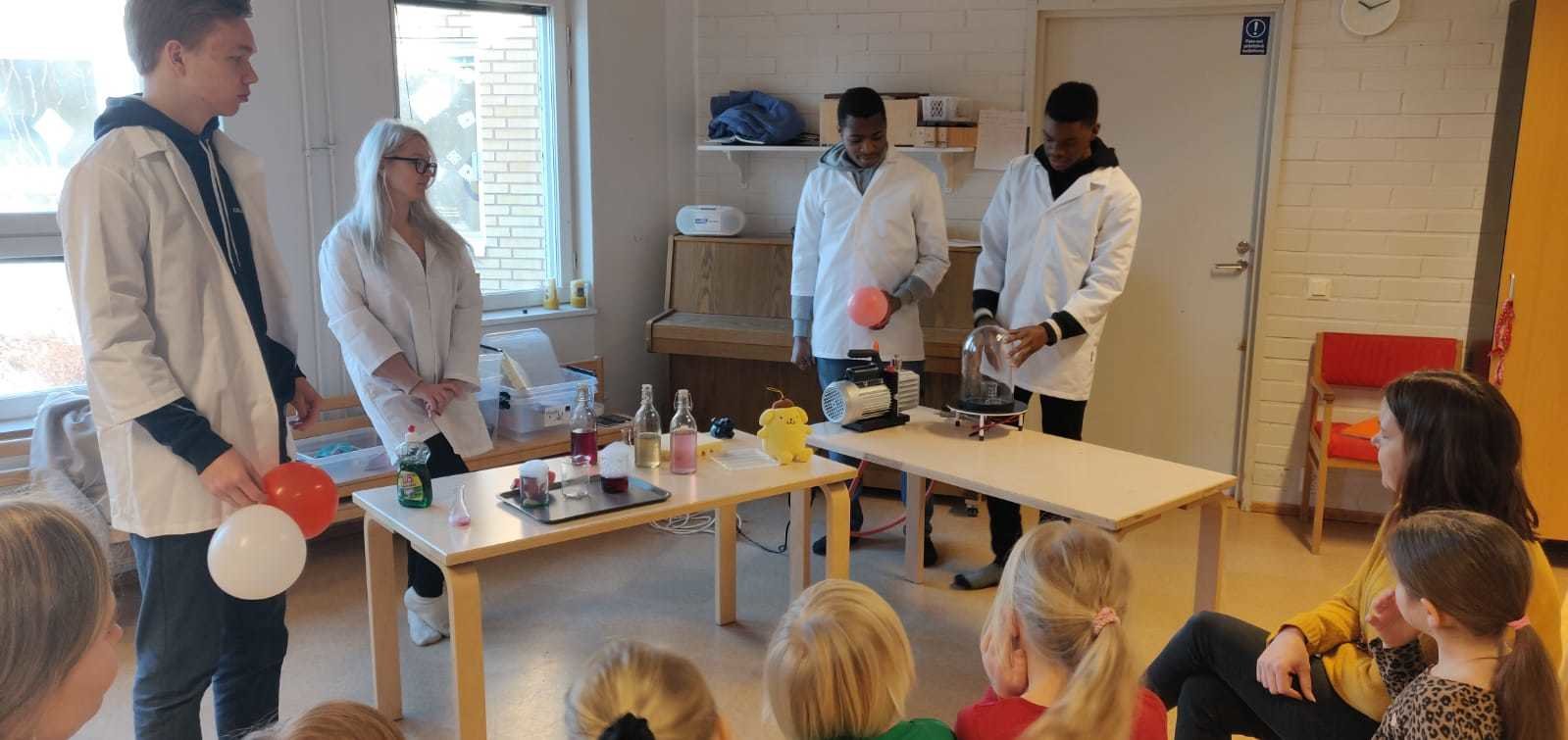Teachers work and professional development in STEM
M.Sc. Lauri Hellsten ( laurihellsten)
math and physics teacher (10 years in the profession)

- Introduction
- Teaching in Finland
- STEM examples from the classroom
- Examples from professional development
- Graduated in 2010 from the University of Helsinki
- Full-time upper secondary school teacher from 2011.
-
Part-time project planner and teacher in the University of Helsinki.
- use of ICT in math education (e.g. GeoGebra)
- assessment in lower and upper secondary schools.
- Training in-service teachers in the use of ICT, assessment and curriculum with MAOL ( = math + chemistry + physics teachers union)
- Assistant member of the mathematics matriculation board
- Author of digital textbooks for upper secondary school physics and mathematics.
About the speaker
-
About 600 student upper secondary school
- Located in Espoo next to the Kera train station.
- Students apply with 7,8 grade point average
- Emphasises entrepreneurship, global citizenship, sustainable development and social skills for the future.
- LUMA (STEM) developer school
-
Lots of international projects (CERN course, Model UN course, German history course, Shanghai-exchange)
- Students learn to understand cultural differences and they learn valuable lessons on how to live in a globalised world.
- Open minded and innovative teachers developing new teaching methods
About Espoon yhteislyseo
CC BY SA naosuke ii
1. Upper Secondary Schools Act
2. National core curriculum
-
300 pages altogether
-
13 pages math curriculum
-
5 pages physics curriculum
3. Local curriculum (mostly same as #2)
4. Matriculation exam
What guides the teacher?
CC BY SA naosuke ii
Keypoints from the curriculum
- Focus on assessments for learning.
- Emphasis on the formative assessment.
- Student must show diverse knowledge on the contents and goals of a course for the courses summative assesment.
- Specific ICT skills as goals in STEM-courses
- Digital matriculation exam
- Use of programs (GeoGebra, LoggerPro, etc.) in STEM-courses.
- New type of problems involving large scales of different type of digital materials (real life data, videos, simulations, etc.) that couldn't be done in the paper exam.
Upper secondary school in Finland
1. semester
2. semester
3. semester
1. period
2. period
3. period
4. period
5. period
min. 150 credits and usually 3 years
usually 6 + 1 weeks
5 - 7 courses,
1 course = 3 x 75 min per week = 2 credits
Matriculation exam at the end, min. 5 exams
Lauri's current schedule

- Problem: Quite a lot of work as the only B-level math and physics teacher in my school.
-
My solution: Started to activily network with other STEM teachers in social media (e.g. Facebook) and different training days organized by the LUMA centre or the university of Helsinki
- New ideas + friends + approaches to teaching + sharing teaching material
- Organized my first LUMA days in 2012 in Askola upper secondary school.
As a new teacher
2011 - 2013

LUMA-days organized in Askola got attention from the local media.
Our main focus was to inspire students to pursue their studies in STEM fields.
- Problem: Quite a lot students who attended upper secondary school studies and vocational studies. They had to be absent quite a lot from upper secondary school studies.
- My solution: While networking, came across like minded teachers and started to create learning videos for the students.
As a relatively new teacher
2012 -> present

Opetus.tv (Finnish "Khan Academy") has over 23 000 000 views and 2 000 videos for lower and upper secondary schools ranging from math, physics, chemistry to biology.
The service was and still is free of charge to anyone who wishes to use it.
Collaboration with LUMA centre

- Students visit Fotoni and Gadolin laboratories in the University of Helsinki.
- Visitors from the University of Helsinki to our courses.
- Planning and trying out new teaching methods and materials (e.g. PIRE-project)
- Planning new projects with the LUMA centre (e.g. STEM circus-course).




Collaboration with LUMA centre
- Organizing workshops for in-service teachers and teacher students with the help of LUMA centre.
STEM circus -course


- Students visit local kindergarden and organize a "STEM circus".
- Students show safe scientific demonstrations to the kids that they plan themselves with the teacher.
- Students need to figure how to explain these demonstrations to kids.
CERN-course

- Every second year we organize a CERN-course.
- The course includes a three day visit to CERN for 10-12 of our students.
- On-going project that many Finnish upper secondary schools take part of.


Let me hack it! -course
- Let me hack it! -course is an programming course, where students learned to program with arduino.
- Was held for the first time during the covid pandemic.

Applied mathematics -course
- Introduction course how to use programs (e.g. GeoGebra, TI-Nspire and LibreOffice) in mathematics.
- "Mandatory" for first year students.



STEM workshop
- Weekly open workshop for the students.
- Students can come and go as they please.
- Always a teacher present.
- Free cookies, tea and coffee
Use of ICT in STEM
- Hands-on-approach to learning.
- Students use digital software to measure different phenomens and experiments.
- Digital textbook with authentic data, simulations and real-time feedback.





Course material includes videos, about 50 per course
Developing flipped learning

Multiple choice questions after each section so that the student can check his or her understanding.
Self-assessment throughout the course
Developing self-assessment
The teacher guides the student to identify what the studied topic is about and compare their own perceptions and views on the whole.
Unit 1
Self-assessment
1A
passed
Unit 2
Self-assesment
2A
failed
Self-assessment
2A
failed
passed




Applying
Understanding
Remembering
Evaluating
Analyzing
Applying
Understanding
Remembering
Evaluating
Analyzing
passed
Developing self-assessment
Developing digital textbooks

Text

Training and conferences





Yearly LUMA centre days
Yearly MAOL days
Helsinki University's own training days and conferences
ASEF, NGGN, etc.
Thank you!
Lauri Hellsten
lauri.k.hellsten@gmail.com